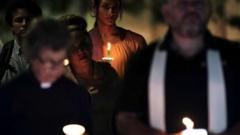A commemoration marks the profound suffering endured at one of the Nazi regime's most notorious concentration camps.
**Remembering Bergen-Belsen: 80 Years After Liberation**

**Remembering Bergen-Belsen: 80 Years After Liberation**
Eighty years later, survivors and families gather to reflect on the tragic history of Bergen-Belsen.
Eighty years have passed since British and Canadian forces liberated the Bergen-Belsen concentration camp in Germany, revealing the stark horrors of the Holocaust. On Sunday, commemorative events drew over a thousand survivors and their families to honor the memory of those who suffered. Bergen-Belsen stands as a chilling testament to the atrocities committed during World War II, where approximately 70,000 people, primarily Jews, perished from malnutrition, disease, and inhumane conditions.
The liberation in April 1945 unveiled a horrific scene, with British soldiers discovering around 13,000 unburied corpses amidst a sea of emaciated survivors—estimates indicate that the camp housed 60,000 living skeletons who battled various diseases. Michael Bentine, a British soldier present during the liberation, described Belsen as the “ultimate blasphemy,” a sentiment echoed by the first broadcaster to enter the camp, Richard Dimbleby, who characterized it as the worst day of his life.
Unlike other camps further east, which were destroyed prior to liberation to obscure Nazi crimes, Bergen-Belsen remained intact, allowing the full extent of its grim legacy to be revealed. Without gas chambers, deaths soared due to the complete breakdown of the camp's systems, exacerbated by overcrowding. Tragically, many who survived the initial horrors succumbed shortly after liberation; even the aid intended to save them became a death sentence as their bodies rejected rich food.
As families gathered to remember the lives lost, dignitaries, including UK Chief Rabbi Sir Ephraim Mirvis, participated in the remembrance ceremony, which featured the laying of wreaths by representatives from the AJEX Jewish Military Association. The past resonates deeply in the serene landscape of Lower Saxony, where the haunting memories of Bergen-Belsen flash through time, much like a forgotten nightmare woven into the grass beneath. A visitor center offers insight and reflection among the few memorial stones honoring the dead, reminding all of Bergen-Belsen's tragic history—where approximately 5,000 souls rest, forever etched in the annals of human suffering.




















